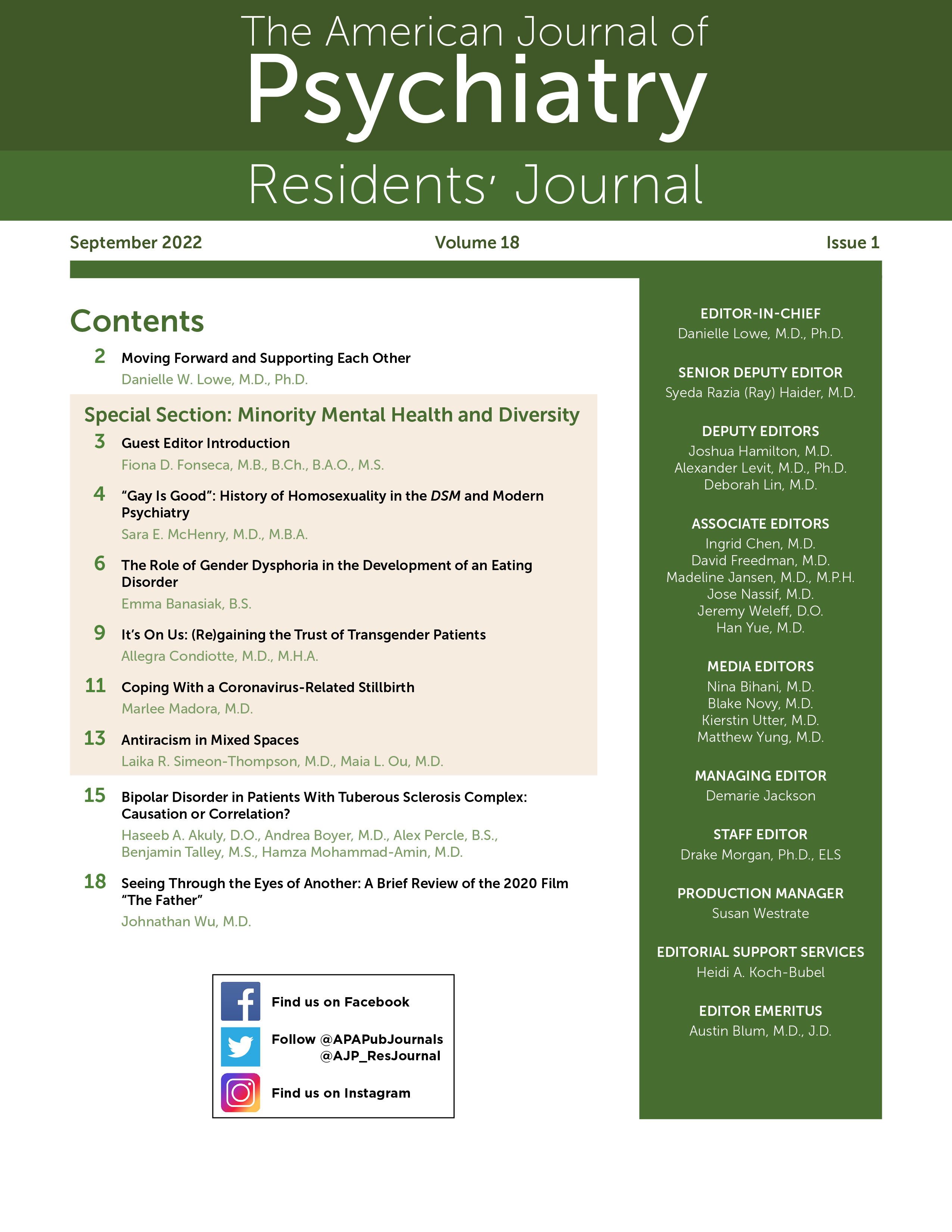Last year, I received a series of messages from a friend whose son was being held in a psychiatric emergency department. He had presented with depression but was not suicidal and did not meet criteria for an involuntary hold. Upon learning he was transgender, however, staff misgendered him and announced their intention to hold him solely on the basis of his gender identity, stating “if she was a she, she could go, but since she’s a he, she has to stay.”
Medical mistreatment of transgender individuals is common. In the 2015 National Transgender Discrimination Survey, 33% of respondents reported at least one adverse experience while seeking health care, including being denied care, being harassed or assaulted, or having to educate their provider about basic facts regarding their health and well-being (
1). As a result, many respondents reported avoiding or delaying medical care (
1).
History speaks for itself. In 1996, Tyra Hunter, a Black transgender woman, was brought to the emergency department after a car accident; instead of treating her, providers mocked her as she died (
2). In 1998, Robert Eads, a transgender man, was diagnosed as having ovarian cancer but was repeatedly refused treatment and died a year later (
3). In 2012, Shaun Smith, a Black transgender woman, died of ketoacidosis after providers failed to diagnose her diabetes; when she sought medical treatment, she was diverted to mental health and never medically assessed (
4). Psychiatry was used as a weapon, pathologizing her experiences and providing an excuse to ignore her needs.
However, the need for psychiatric care in this population is great. Forty-one percent of transgender adults report having attempted suicide (
1). In 2021, more than 75% of transgender and nonbinary youths reported symptoms of generalized anxiety, more than 66% reported symptoms of depression, and half reported that they had seriously considered suicide within the past year (
5).
Less than 1% of physicians identify as transgender, and those who do report facing significant discrimination (
6). In 2011, the available data revealed that, on average, medical schools provided a total of 5 hours of training on LGBTQ+ issues, and transgender issues were the least covered, leaving physicians exceptionally underinformed (
7). The American Psychiatric Association and multiple other medical organizations have stated their support for transgender individuals, but the situation is far from resolved (
8–
10).
The first step forward is to drastically increase the amount of time spent educating medical students and residents about LGBTQ+ issues and to make medical education more welcoming and accessible to transgender applicants. Psychiatry residencies should provide primers on working with transgender patients, as well as specific training in addressing distress related to discrimination, understanding the ways hormone replacement therapy may affect psychiatric symptoms, providing support for patients seeking transition, and other relevant topics.
The Transgender Training Institute suggests the following first steps toward improving care (
11):
•
Educate yourself on the experiences of transgender, nonbinary, and gender-nonconforming patients.
•
Use respectful language, including correct names and pronouns. Correct any mistakes that you make; apologize for the error; make the corrected statement; and then proceed. A hypothetical scenario is as follows: Physician: “Mr. X, I sent the prescription to your pharmacy.” Patient/advocate: “It’s Miss X, actually.” Physician: “I apologize for the error. Miss X, I sent the prescription to your pharmacy. You should be able to fill it tomorrow.”
•
Focus on patients’ needs. If their gender and/or transition is not relevant, do not focus on it. For example, if you are treating posttraumatic stress disorder caused by a car accident, there is no reason to ask questions about the patient’s genitals, and doing so would be inappropriate.
•
Help patients navigate the medical system, advocate for them with regard to insurance if coverage is denied based on a gender marker, and defend them when they experience discrimination.
•
Hire transgender educators to train staff, and make your workspace welcoming to transgender employees. Address concerns, and work to correct problems.
•
Be aware of the standards of care set by the World Professional Association for Transgender Health, as well as services you may be asked to provide in support of a patient’s transition.
The process of improving care for transgender patients will be gradual, but it is vital. As psychiatrists, we can be patients’ worst abusers or their greatest allies. If we want patients to trust us, we must earn that trust through action. Respectful, affirming treatment of transgender patients is the standard of care—it is high time that we meet it.
